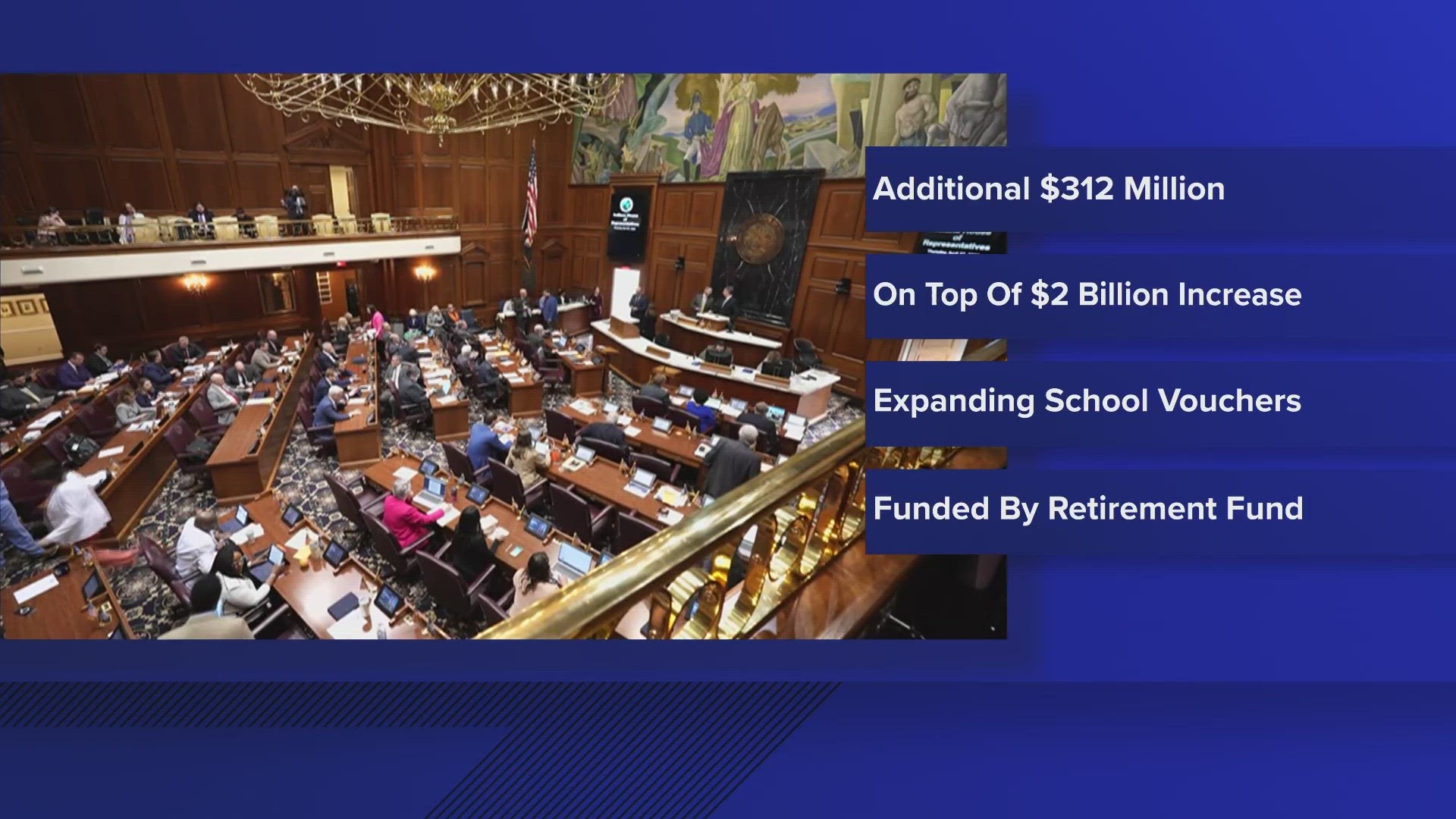INDIANAPOLIS — Indiana public school groups were making a late push for additional school funding Thursday as state lawmakers moved toward expected final votes on the new two-year state budget.
The Republican-dominated Legislature was nearing the end of this year’s session the day after GOP leaders released a planned budget deal that greatly expanded eligibility for the state’s private school voucher program.
Democrats had criticized the Republican proposal as short-changing traditional public schools with funding increases less than the inflation rate. The proposed school voucher expansion could consume more than 40% of the planned nearly $1.2 billion increase for general K-12 funding over the next two years.
Longtime education lobbyist Dennis Costerison said school district leaders began contacting lawmakers with concerns after school funding projections released Wednesday showed that nearly 75% of the state’s school districts would receive funding increases of less than 2% in the budget’s second year.
“With schools, and everybody else from the governor to the General Assembly, wanting to get more money for teacher salaries, where’s that money going to come from?” said Costerison, executive director of the Indiana Association of School Business Officials.
Republican budget negotiators didn’t immediately comment on possible last-minute changes to the budget. Republican House Speaker Todd Huston left the House floor late Thursday afternoon, simply telling reporters he intended to have a budget vote that night.
The GOP budget agreement announced Wednesday boosted total base K-12 school funding by 6% in the first year and 2% the second year. But traditional school districts would only see projected average increases of 3.5% and 1.1% after more than $500 million was diverted to pay for a 75% increase in the number of students receiving the state vouchers toward paying private school tuition.
The school funding discussion overshadowed other less-discussed provisions in the budget plan that included extending an automatic inflation-related increase in the state gasoline tax by three years and providing sizeable pay raises for the governor and other statewide elected officials starting in 2025.
The gasoline tax pays for infrastructure projects and currently rings in at 33 cents a gallon after being allowed to go up 1 cent each July since 2017 when Republicans boosted it to 28 cents from 18 cents. The annual increase was set to expire in 2024, but the budget bill extends it to 2027.
Republicans rebuffed calls from Democrats last year to suspend state gasoline taxes. The levy also includes a 7% sales tax that will stand at 20.3 cents a gallon in May. Prices jumped after the Russian invasion of Ukraine.
House Ways and Means Committee Chairman Jeff Thompson called extend the annual increase a “reasonable” step amid rising construction costs.
“It was just a compromise to look at those increased costs,” Thompson said “Also, as you see the amount of collections are going down, with better mileage and other types of vehicles, it’s just to keep the revenue kind of where it’s at.”
The budget bill also would raise salaries for the governor and other officials by linking their pay to that of state Supreme Court justices, who receive annual raises in line with those given to other state employees.
The pay increase, which would take effect after Holcomb leaves the governor's office, would boost the incoming governor’s pay nearly 50% from the current $133,683 to match the $198,513 paid to the five justices. The lieutenant governor, attorney general, secretary of state, state auditor and state treasurer would all receive pay bumps of at least 39% as their salaries would increase to between 60% and 88% of what court justices get.
“You need to set them to some type of standard,” Thompson said. “It makes sense so that they’re all tied together.”
Democratic Rep. Ed DeLaney said he found it “troublesome” that those proposals had not been previously debated and that Republicans also added budget provisions such as directing $89 million toward an undefined “amateur sports facility” and $37.5 million for construction of a 400-acre local park along the Ohio River between New Albany and Jeffersonville.
“Some of these policy decisions need to be debated,” DeLaney said. “But apparently some people have figured out that not debating them is more likely to lead to success.”

